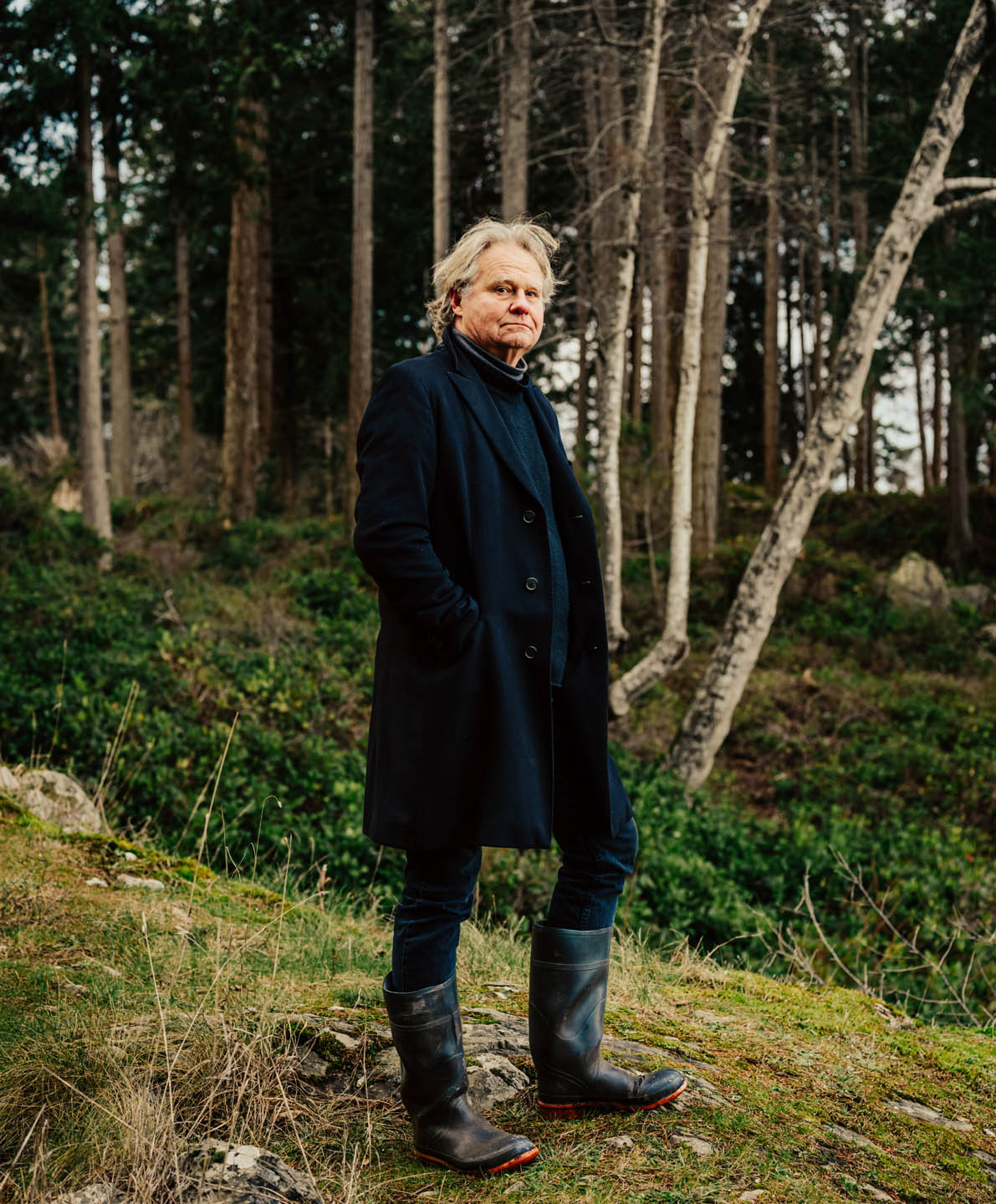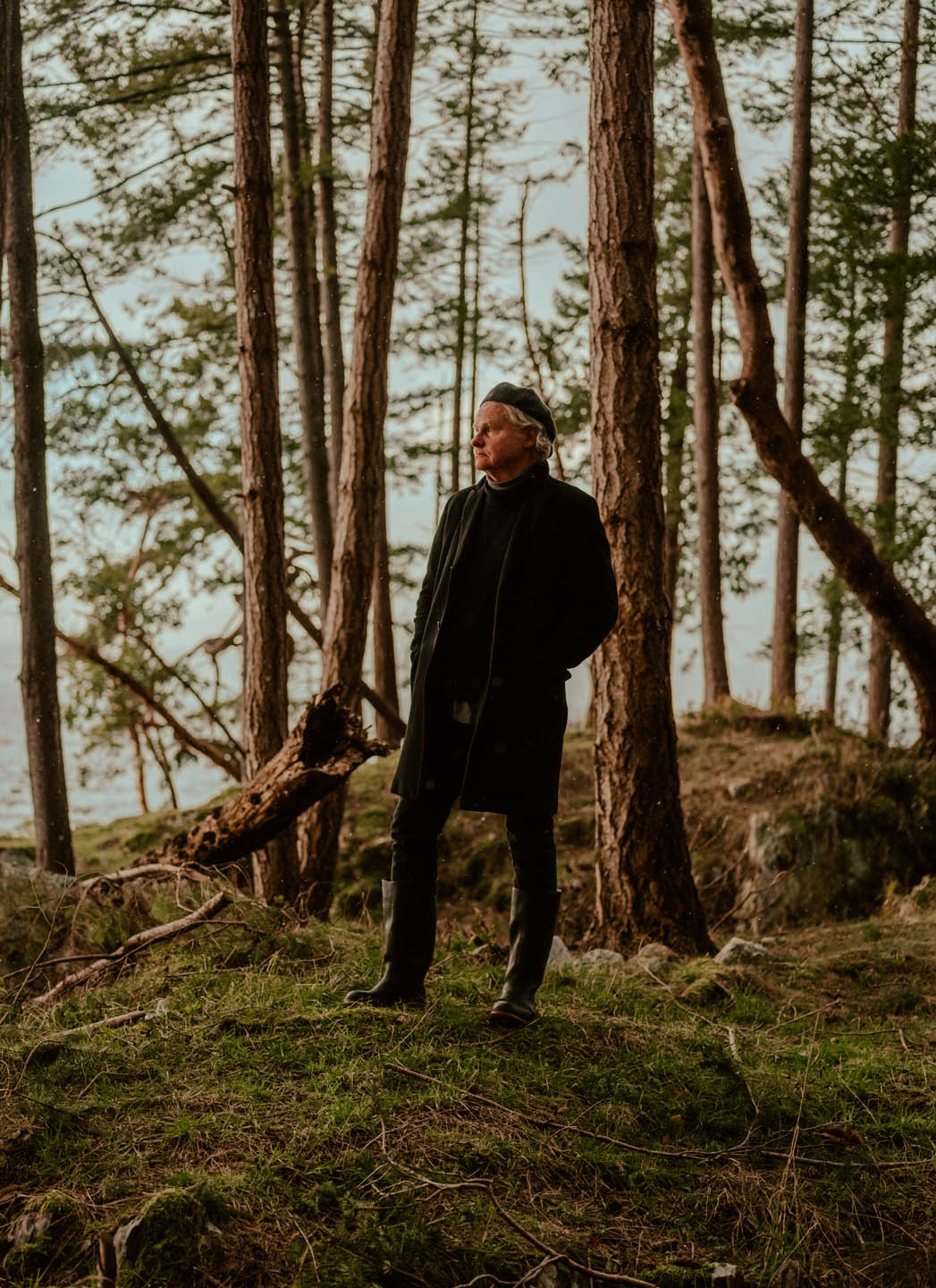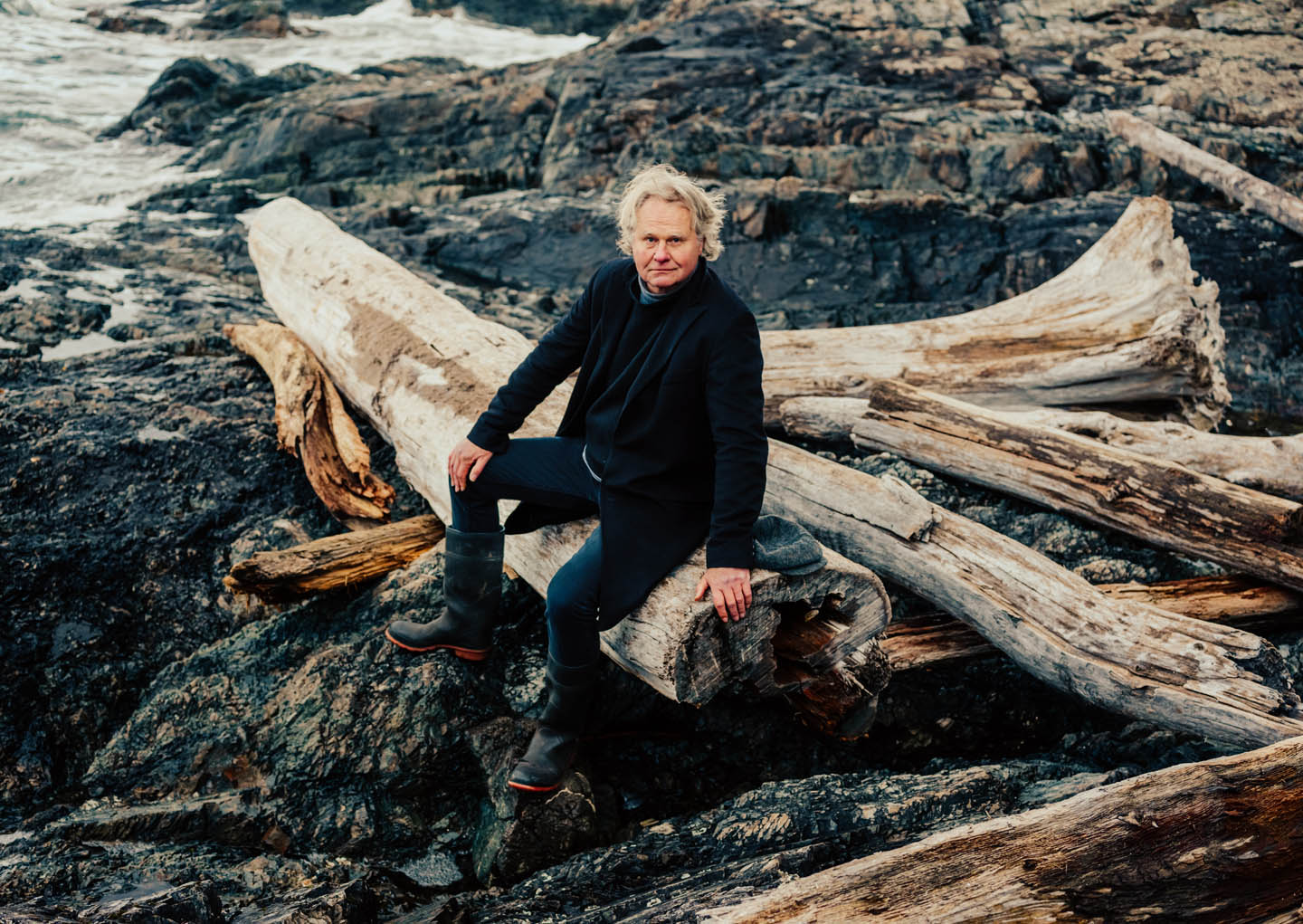Wade Davis believes he may be the only person ever ejected from Harvard’s science library. Far from an ignominy, the incident holds pride of place in a memory more typically concerned with the botanical savvy of rainforest cultures or the ongoing attrition of many of the world’s 7,000-plus languages. But like all Davis tales, it’s a good one.
Having never taken a biology course until third-year university, Davis suddenly found himself memorizing complex metabolic pathways in which electrons are passed molecule-to-molecule like relay batons. “A lot of students were intimidated,” he recalls, “but for me they read like origin myths.” As he tells it, the night he finally understood the Krebs cycle—a veritable Swan Lake of chemical pas de deux that converts the sugars assembled by photosynthesis into cellular energy through aerobic respiration—he freaked out. “It was like a miracle to me. I went running around like a maniac, shaking people, saying, ‘Do you know how respiration works?’ Security eventually took me out.”
While this anecdote isn’t among the essays collected in Davis’s latest book, Beneath the Surface of Things, it exemplifies how curiosity, as author John Crowley observed, can manifest as lust—“a wandering cupidity of the eye and the mind.”
Though a youthful Davis acted like someone in love bent on shouting it from the proverbial rooftops, his passion to uncover and share vital knowledge became his stock-in-trade as a celebrated ethnobotanist, author, filmmaker, and speaker. But like most precious gems, that fundament acquired in the Harvard library retained its value. “I don’t think you should be able to run for office if you can’t recite the formula for photosynthesis,” says the now 70-year-old. “The fact that carbon dioxide combines with water, sparked by photons of light, to give us the food we eat and the air we breathe—that’s the formula of life.”

Though he stops short of averring that science-illiterate politicians are indeed herding us over a cliff, it’s an inference profound enough to provoke its own train of thought—a notion that perfectly captures the essays in Beneath.
I’ve taken a ferry to Bowen Island to meet with Davis. Just in from Mexico and en route to an appearance in Santa Ana, with characteristic generosity he has granted scant turnaround time to an interview. The ferry was delayed by weather—enormous cross-swells stirred by an Arctic outflow that also knocked down trees and cut power to his home in the woods. Yet huddling at a wood stove, tea in hand, drawn close by frigid temperatures, seems entirely appropriate for a confab with the noted raconteur—a leitmotif echoing the multitude of fireside conversations he has conducted in a 50-year career.
“I found myself travelling through worlds of words and finding books that totally inspired me and caused me to think and write on new subjects.”
Like many thinkers freed from quotidian demands to indulge ideas they might not otherwise have had time for, Davis put together Beneath as a pandemic project: essays written, updated, or repurposed, as he says prosaically, when “everybody’s plans went through the car wash.”
Beneath isn’t the first Davis book to collate disparate ideas (that would be Shadows in the Sun), but it’s certainly the most eclectic and—for those with little idea of his ability to roam as widely in intellectual realms as earthly ones—perhaps unexpected. “Being unable to travel, books displaced ethnographic expeditions,” he says as candles flicker at the edge of our vision. “I found myself travelling through worlds of words and finding books that totally inspired me and caused me to think and write on new subjects.”
In a now-dated documentary, a stentorian narrator intones, “Wade Davis is a witness to the distant traces of human existence.” And whether introduced via his descent into the secret societies of Haitian Vodou in The Serpent and the Rainbow, the various cultural immersions of subsequent volumes, or the 2009 Massey Lecture series The Wayfinders broadcast on CBC Radio, this is indeed how many perceive Davis: a learned revenant who, by reporting in experiential, often spellbinding depth, opens western eyes to lesser-known aspects of the human experience. With Beneath, however, Davis has also taken his anthropological magnifying glass to the tire tracks of modernity. Here, he turns not only to more familiar histories—for instance, how the horrors and heroics of the First World War birthed nations and provided a logical segue to the conquest of Everest or how British occupation of the Middle East led to a promised land in which Israelis and Palestinians will forever struggle to coexist—but also to the racial divisiveness and anti-science fear-mongering we collectively bore witness to and had cause to reflect on while doomscrolling our way through the pandemic’s first year. “I’ve never thought there was something I didn’t have the right to write about,” he says.
While an anthropological perspective invites such analysis, Davis is careful to make clear why. In “Why Anthropology Matters,” he examines how early practitioners gave us the world we live in today and also how the discipline is losing its way. “I grew up in the era of activism anthropology, very much in the tradition of Ruth Benedict and Franz Boas,” he says. “And now anthropology just studies itself. The postmodern kind of neurosis.”

German American scholar Boas was a towering figure of cultural anthropology whose influence on our modern worldview, Davis believes, puts him on par with Darwin, Einstein, and Freud. “[Boas] informed all who would listen that the other peoples of the world were not failed attempts to be them,” he writes. “Every culture was a unique expression of the human imagination and heart. Each was a unique answer to a fundamental question: What does it mean to be human and alive?”
It was a perspective that crossed time, geography, and the traits Victorians had once erroneously construed as race, now handily dispelled by our understanding of DNA: Homo sapiens is a single, pan-global species, the most inventive, successful, and potentially harmful the planet has known in the almost four-billion-year history of life. Our real differences lie only in how we answer that question—challenges Beneath lays bare.
The opening essay, “This Is America,” unearths the U.S.’s tectonic societal rifts and often delusional sense of its own internal history yet wraps with a note of positivity, hope, and optimism, trademark of the author’s balanced approach to humanity—at once horrified by its callousness yet ever-astonished by, and cheerleading for, its potential. “I was always haunted by what Alex Chadwick of NPR had said to me one night in Africa—that race is the story of America,” he says. Living in Washington, D.C., as an Explorer-in-Residence at the National Geographic Society, he’d pondered the question. Reading, research, events, and the perceptions of peers convinced him to explore the actual history. “Every single thing in that essay is exactly what happened,” he says. “There’s no editorializing. It’s just very revealing.”
Davis also marshals uncomfortable truths in “The Unravelling of America,” which was first published online by Rolling Stone in August 2020, logging five million reads and 365 million social-media impressions—perhaps expected for an essay that, turning on the country’s appalling COVID response and civic upheaval following the murder of George Floyd, heralds the end of the American century. “I think people were desperate for something that explained what was going on and put it in a certain context,” he says. He compares this longing to a quote by Senator Cory Booker: “If America hasn’t broken your heart, you don’t love her enough.”

Likewise, “Beyond Climate Fear and Trepidation” may be a difficult read for climate activists unrealistically married—as Davis suggests with real-world data—to radical actions that might destabilize economic prospects for the world’s poorer societies as well as the psychological well-being of our children. Bullish on humanity’s proven problem-solving and technological acumen, he instead advocates for “a middle way, one that calls for sensible and open dialogue, with the goal not just of reducing carbon but of improving the well-being of all people and the natural environments in which they live.”
The collection’s most important entry, Davis believes, is the one that garners the least attention. “The Divine Leaf of Immortality” takes on the demonization of coca, sacred plant of the Inca. Here, Davis’s voice is not only informed by his work as a field ethnobotanist but also by the decades of travel and research behind two books—Magdalena: River of Dreams, a love letter to Colombia, and One River, documenting his Amazon explorations in the footsteps of his doctoral adviser, Richard Evans Schultes. Davis is revered as a truth-teller in Colombia to the extent he has been granted not only honorary citizenship but also an ambassadorship for its tourism industry. “Part of that truth is that consumption of cocaine murdered 400,000 Colombians, drove seven million from their homes, and dispatched five million into exile,” he laments. Perhaps the single most comprehensive synopsis of the dilemma, the essay is a clarion cry to uphold both people and landscape, leave a medicinally and spiritually important plant alone, and expunge the absurd monies of foreign cocaine consumption from the equation. “Colombia will never have peace as long as that trade exists.”
“The full measure of a culture is not just what they do but the quality of their aspirations and the metaphors that drive them forward.”
Anyone who has heard Davis speak is rapt by his passion, depth of knowledge, and encyclopedic recall: “It’s because I’m a storyteller, and once I tell that story, they become living things. And how can you forget them?” Our conversation is a similar exercise in erudition that crosses oceans, climbs mountains, and penetrates jungles, at every point connected to myriad cultures, experiences, and ideas—the paths Davis has trodden and often returns to. He musters his previous books like children gathered at his feet, each a unique personality with equally important meaning and message, as both conduits for informed thought and vehicles to sate curiosities. His fondness for each is tempered only by a hindsight that sees the risk in having produced works differing so radically from one another—like disappearing for six years after The Serpent and the Rainbow to reemerge with a biography of Schultes. Much like the risks of a career driven by opportunities of interest that saw Davis work as a ranger for BC Parks and even as a logger, only because, sensing the fight for B.C.’s old-growth forests on the horizon, he “wanted to be darn sure that no one could ever tell me I didn’t know what I was talking about.”
I don’t notice the embers blinking out in the wood stove, and when Davis departs to fetch wood, I realize we’ve yet to broach the one notion that crops up repeatedly throughout and provides a coda to Beneath—the idea of the sacred. What does it mean to humankind? How has it shaped our species?
“Every culture faces the same adaptive imperatives—we have to feed our kids, have our kids couple in a consistent way, deal with the agony of old age and the mystery of death,” he says, noting religion is all about death, an “attempt to wrestle with eternity and come out on top.” The sacred, he counters, is all about life and aspiration, a biological relationship. “The full measure of a culture is not just what they do but the quality of their aspirations and the metaphors that drive them forward.”
In the pages of Beneath, Davis reshares the lifetime of wisdom he has gleaned, his observations at times calling to mind an aphorism by the American anarchist Elbert Hubbard: “To avoid criticism, say nothing, do nothing, be nothing.” Davis has never shied from courting such censure, relentlessly speaking out, engaging in the best traditions of activist anthropology, and becoming as fearless a thinker as he is cultural adventurer, a man with a gift, as The Washington Post’s David Ignatius notes, for “saying the unsayable.” True or not, when one so informed looks beneath the surface of things, the seemingly routine becomes revelation; the inexplicable, comprehension. Throughout human history, not only has knowledge itself been considered sacred but indeed, too, the hidden mysteries it can reveal—like the Krebs cycle.
Read more from our Spring 2024 issue.









